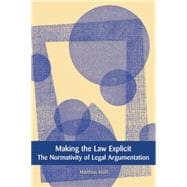
| Introduction | p. 1 |
| The Doctrine of the Limits of the Wording | p. 4 |
| Interpretation and Invention in English Legal Reasoning | p. 7 |
| Towards a Common European Approach | p. 15 |
| The Possibility of the Rule of Law Defended | p. 18 |
| The Sceptical Challenge: Indeterminacy and Vagueness | p. 19 |
| The Rationality and Objectivity of Legal Reasoning | p. 23 |
| At a Glance | p. 27 |
| The Doctrine of the Limits of the Wording | p. 33 |
| The Limits of the Wording in Hermeneutic Legal Theory | p. 33 |
| The Limits of the Wording in Analytic Legal Theory | p. 44 |
| The Deconstructivistic Challenge of the Structuring Legal Theory | p. 54 |
| The Results of the First Chapter | p. 64 |
| Normativity and Objectivity of Linguistic Meaning | p. 87 |
| Introduction | p. 87 |
| The Normativity of Linguistic Meaning | p. 96 |
| The Objectivity of Linguistic Meaning | p. 181 |
| The Results of the Second Chapter | p. 207 |
| Semantic Normativity in the Law | p. 211 |
| Addressing the Three Central Issues | p. 211 |
| The Theory of the Limits of the Wording | p. 230 |
| The Results of the Third Chapter | p. 274 |
| Bibliography | p. 283 |
| Index | p. 301 |
| Table of Contents provided by Blackwell. All Rights Reserved. |
The New copy of this book will include any supplemental materials advertised. Please check the title of the book to determine if it should include any access cards, study guides, lab manuals, CDs, etc.
The Used, Rental and eBook copies of this book are not guaranteed to include any supplemental materials. Typically, only the book itself is included. This is true even if the title states it includes any access cards, study guides, lab manuals, CDs, etc.